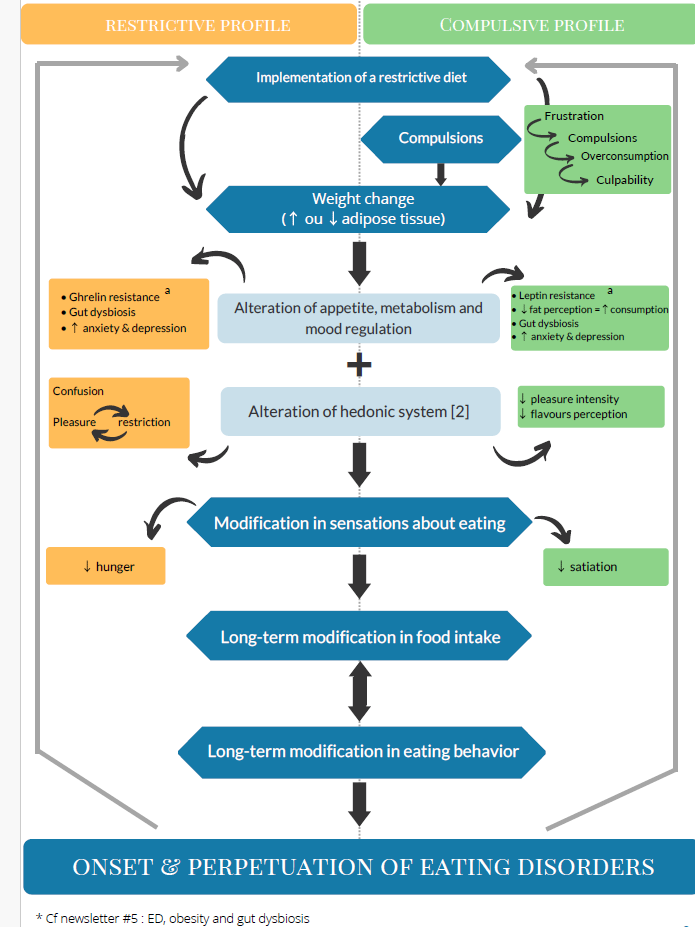Sensations About Eating, Eating Disorders & Obesity
Source : Nutriactis/Rouen-Normandie hospital
Summary
- Introduction
- Loss of sensations about eating
- Point of reconnecting with sensations about eating
Introduction
Without pathology, sensations about eating (SAE) reflect our body’s needs, and when we listen to them, we ensure the balance of our energy and nutritional requirements. However, in some cases, sensations about eating no longer reflect our body’s needs. These situations can become pathological if chronicity (repetition over time) sets in. Which is generally the case for patients suffering from eating disorders (ED) and / or obesity .
We hope that, by discovering this newsletter, you will learn more about the phenomenon of loss of sensations about eating, its consequences and will appreciate the suggested exercise at the end of the newsletter.
Loss of sensations about eating
Patients suffering from ED and/or obesity generally have repeated eating behaviors
established over time, which can lead to an alteration of the reward system. This alteration can lead to a reduced perception of sensations about eating and thus the perpetuation of certain eating disorders.
Two profiles stand out:
- Restrictive profil: the implementation of a repeated and voluntary food restriction, associated with satisfaction, induces a loss of the ability to listen to ones sensations about eating and in the long term can lead to a complete loss of the sensations about eating themselves.
- Compulsive profil: as a result of repeated episodes of compulsive binge-eating, the people described can lose control of their eating habits and no longer take into account their sensations about eating. By ignoring their sensations about eating, these may fade away over time until the point where they become imperceptible.
Moreover, the guilt induced by binge-eating episodes can also lead, in some people, to a restrictive behavior in order to compensate the previous food intake, which they perceive as an excess.
In both cases, a repeated fight against our cravings or giving in to them in excess, induces the risk of confusing pleasure – reward – restriction, and thus promote the onset of ED.

Ghrelin resistance and leptin resistance are hormonal phenomena that affect food
intake in opposite ways.
Resistance does not mean that the hormone is no longer present in the organism. The problem is not in the production of the hormone, but in the efficiency of its pathway. As the circuit is altered, this explains that the hormone in question is found in higher concentrations in people with resistance.
- Ghrelin is an orexigenic hormone better known as the hunger hormone. Ghrelinresistance leads to a reduced sensitivity to the sensation of hunger and thus a restricted food intake. This hormone is found in higher concentrations in patients with anorexia nervosa.
- Leptin is an anorectic hormone, also called the satiety hormone. Leptin resistance induces a loss of satiety, and therefore an increased food intake. Consequently, this hormone is found in higher concentrations in patients with bulimia nervosa.
Point of reconnecting with sensations about eating
Recognizing and responding to our sensations about eating allows:
- A weight normalization and maintenance
- A reduced risk of compulsive behavior
- A regulation of food intake
- A stable energy balance
- A better coverage of the body’s needs (energy, nutrients, vitamins & minerals)
Thanks to minful eating

Mindful eating might be a relevant exercice to reconnect with your sensations about eating, through 2 main principles:
- Mindful eating instigates careful attention to the physiological and emotional signals.
- So, food intake will reflect the body’s needs and will provide the organism with what it requires without excess or lack.
- Echoing the principle mentioned above, mindful eating could limit the influence of external signals on ones food choices (qualitative and quantitative), and help refocus on ones physiological signals .
Conclusion
As explained above, a situation of loss of sensations about eating may lead to alterations in eating behavior. Thus, an eating disorder and/or obesity could onset or be perpetuated.
Re-learning to listen to these physical sensations of hunger and satiation can help to restore the energy balance.
In any case, it is essential to satisfy your physiological needs and to maintain a balanced dietary structure (3 meals ± 1 snack), and this even among subjects that have completely lost the sensation of hunger.
A total lack of hunger can be misleading, since the organism still needs energy intake to match its expenditure.
Mindful eating can be an interesting tool in order to resynchronize ones sensations about eating.

While waiting for the NutriActis intervention program (phase 2), here’s a preliminary exercise that will allow you to start listening to your sensations about eating.
This scale is to be used at the beginning and end of each meal, even snacks:
- Rate your hunger from 1 to 5 before the meal
- Rate your satiety from 6 to 10 after the meal

-
Download this article
pdf – 273 KB
 You might be interested in these articles
You might be interested in these articles